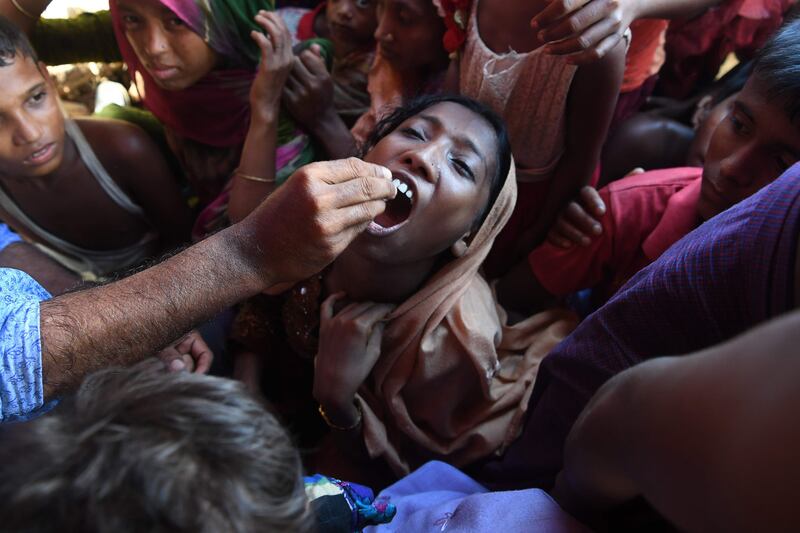The United Nations launched one of its biggest cholera vaccination drives yet on Tuesday amid fears of an outbreak among nearly a million Rohingya living in refugee camps in south-east Bangladesh.
Thousands of Rohingya men and women, many with young children in their arms, lined up in intense heat at makeshift health centres to receive the oral vaccine against the disease.
The UN is working with the Bangladesh government to vaccinate 650,000 people living in the sprawling camps against cholera, which spreads through dirty water and can kill if left untreated.
Read more: Myanmar crisis: Rohingya militants say unilateral truce to end on October 9
"These people lack most of the basic services — toilets, water sanitation, everything," Unicef spokesman AM Sakil Faizullah said.
"When we have this kind of situation, there's a heavy possibility of a cholera outbreak."
Nearly 520,000 Rohingya Muslims have arrived in Bangladesh since late August, fleeing persecution in Myanmar that the UN has said is likely to amount to ethnic cleansing.
Poor and overpopulated, Bangladesh has struggled to cope with the influx of people, many of whom have to travel for days or weeks to reach safety and arrived exhausted and hungry.
The influx had slowed in recent weeks, but appears to have picked up again. An estimated 10,000 refugees arrived on Monday.
World Health Organisation workers, supported by about a thousand local volunteers, plan to vaccinate 650,000 Rohingya over the coming weeks.
They will follow up with a second dose of the vaccine for an estimated 250,000 children aged between one year and five years. Those under a year old will not be vaccinated.
It is thought to be the second-biggest such campaign after 800,000 people were immunised against the disease in Haiti in November.
Volunteers at the Thankhali camp used megaphones to appeal to refugees to go to the centres, where they queued to have the vial placed in their mouths.
"The health workers told us we would be better with medicines, that we wouldn't have any more diseases," said Nabi Hossain, a 35 year old refugee who arrived at the camp two weeks ago, as he queued with two of his sons.
Read more: Rohingya refugee boat capsizes on way to Bangladesh
Abdus Salam, a senior health official with the local government, said workers would go door-to-door to ensure no refugees were left out of the drive.
The UN says more than 600,000 have arrived in the last year, swelling camps that were already home to between 300,000 and 400,000 refugees.
Bangladesh has allocated land to accommodate about 800,000 refugees in one camp, but the UN has warned that such a heavy concentration of people in one area could promote the spread of disease.





